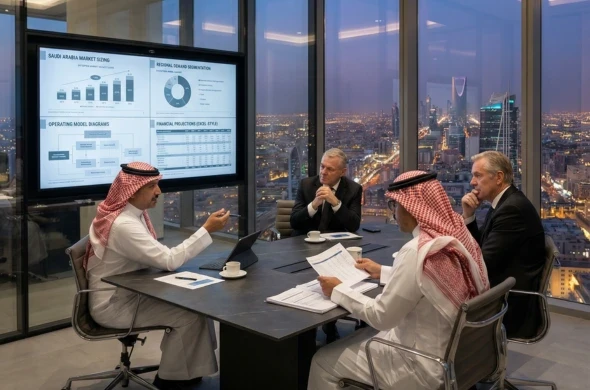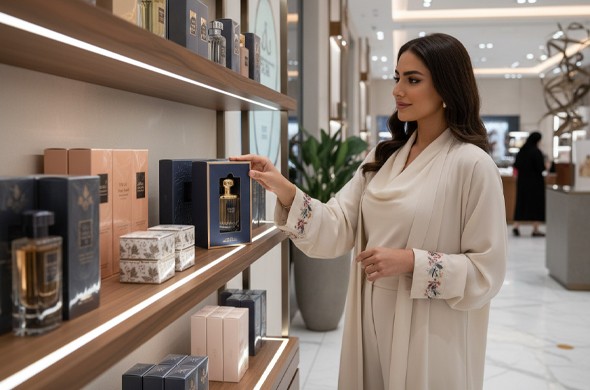69% of global consumers value sustainability more than they did two years ago. In the Middle East and Africa, South Africa leads, with 81% of consumers emphasizing sustainability, followed by Türkiye at 70% and Saudi Arabia at 55%.
The primary concerns driving this trend are the impacts of climate change on personal health and safety, along with the increasing visibility of pollution and waste. Retailers can address these concerns by adopting sustainable retail design. This approach involves creating eco-friendly retail environments that minimise environmental impact while enhancing the shopping experience.
You can minimise environmental impact through eco-friendly materials, energy-efficient lighting, and waste reduction practices. Partnering with the best consultancy firms, like OllenGroup, can help you align your efforts with the latest sustainability standards. Keep reading to discover the key strategies for achieving greener retail spaces.
What is Sustainable Retail Design?
Sustainable retail design focuses on creating retail spaces that are environmentally friendly and resource-efficient. It involves using materials and processes that reduce environmental impact, promote energy efficiency, and support sustainable practices. This approach integrates eco-friendly elements like energy-efficient lighting, recycled materials, and water-saving fixtures.
Sustainable retail design contributes to the broader goal of mitigating climate change. Retailers can protect the environment by reducing carbon footprints and promoting responsible resource use. This approach benefits the planet and ensures a healthier and safer environment for current and future generations.
The importance of sustainable retail design extends beyond environmental benefits. It reflects a retailer's commitment to sustainability, which can enhance their brand image and attract eco-conscious customers. After all, consumers today are more aware of their environmental impact and prefer shopping in stores that align with their values.
Sustainable Retail Design Practices Shaping the Industry
Sustainable retail design practices are reshaping the retail industry, steering it towards more environmentally conscious and efficient operations. Let’s discuss some practices that meet both consumer expectations and sustainability goals:
Moving Beyond Zero Waste
The zero-waste approach is a cornerstone of sustainable retail design. Retailers adopting this practice build their facilities using recycled materials and integrate sustainable practices into their value chains. This commitment reflects a deep-seated vision of sustainability within the industry.
The zero waste policy is rapidly becoming a new standard in retail, pushing companies to minimize waste and maximize resource efficiency. However, sustainability extends far beyond recycling and the circular economy. It encompasses every stage, from selecting eco-friendly raw materials to the conscious and responsible sale of products.
Retailers are now focusing on providing added value through sustainable innovations and practices. For instance, they are opting for minimal or reusable packaging, reducing the need for single-use plastics. This holistic approach reduces waste and promotes a broader vision of environmental responsibility.
Eco-Friendly Material Choices
The choice of materials is essential to sustainable retail design. Embracing SCS-certified materials like Krion and Fitwall demonstrates a strong environmental commitment.
Krion, made primarily from natural minerals, meets high sustainability standards. Its strength, easy maintenance, and low porosity make it ideal for commercial spaces focused on customer health and safety.
Fitwall mineral panels are designed to enhance furniture, walls, and commercial equipment. With recycled PET in its composition, Fitwall provides a sustainable alternative without sacrificing visual appeal.
Incorporating eco-friendly materials in fixtures, flooring, and displays also enhances the aesthetic appeal of the store. It creates a modern, clean look that resonates with environmentally conscious consumers.
Tech-Driven Sustainable Design
Technological innovation is revolutionising sustainable design within the retail sector. Advancements such as3D printing enable precision in using materials, reducing waste during production. This technology allows designers to create complex, customised elements without the excess materials typically left over from traditional manufacturing processes.
Moreover, advancements in technology have led to smarter, more energy-efficient systems. These systems can control lighting, heating, and cooling in a retail environment. These smart systems ensure that energy consumption is optimised according to actual needs to minimise waste.
Tips To Develop a Sustainable Retail Business
To create a sustainable retail business, you must incorporate several key elements that balance environmental responsibility and business efficiency. Here are some essential tips to guide you:
Choose Sustainable Materials
Opt for materials that are recycled, recyclable, or sustainably sourced. You can use these materials for decor or in-store displays. Using materials like bamboo, reclaimed wood, or eco-friendly composites reduces your environmental footprint and supports sustainable forestry and production practices.
Implement Energy-Efficient Systems
Incorporate energy-efficient lighting, heating, and cooling systems. LED lights, smart thermostats, and energy-efficient appliances can reduce energy consumption.
Reduce Waste
Adopt a zero-waste policy within your store. Use minimal or reusable packaging, encourage customers to bring their own bags, and set up recycling stations for customers and staff.
Optimise Water Use
Low-flow faucets, toilets, and irrigation systems can conserve water and lower your utility costs. Consider using greywater systems to recycle water within your operations.
Promote Sustainable Products
Stock products that are eco-friendly, ethically sourced, and sustainably produced. Highlight these products in your marketing to attract environmentally conscious customers. Partner with brands that share your commitment to sustainability.
Optimise Logistics
Streamline your supply chain to reduce carbon emissions. Choose suppliers and partners committed to sustainable practices. Opt for eco-friendly packaging and reduce transportation distances whenever possible.
Leverage Technology for Sustainability
Technology can be a powerful tool in your sustainability toolkit. Use it to monitor and manage energy consumption, streamline logistics to reduce carbon emissions, and employ data analytics to optimise inventory and reduce waste.
The Future of Sustainable Retail Design
The future of sustainable retail design looks promising as technology and environmental awareness continue to evolve. For instance, smart technologies will be crucial in creating sustainable environments.
IoT devices and smart systems can optimise energy usage, monitor environmental conditions, and manage resources efficiently to reduce energy consumption and improve shopping experiences. Modular and flexible designs will allow retail spaces to adapt to changing needs without extensive renovations.
Future sustainable retail design will also emphasise engaging customers in sustainability efforts. Interactive displays, educational signage, and transparent supply chain information will help customers understand and appreciate a retailer's commitment to sustainability. Collaboration between retailers, designers, and sustainability experts will also drive innovation and create a more sustainable retail landscape.
Work With the Best Consultancy Firm
Sustainable retail design is vital for long-term success in today’s market. Embracing these sustainable strategies ensures that your retail space is environmentally responsible and appealing to modern consumers. If you are looking to implement these sustainable strategies, consider working with the best consultancy firms, such as Ollen Group.
As the leading consultancy firm, we have expertise in custom retail design, helping executives develop visions and concepts that enhance customer experience. Our extensive experience in creating inviting, functional, and efficient business environments ensures your brand ambitions are met. Contact us today to get started on developing a sustainable retail space that ensures your business thrives in an evolving market.



